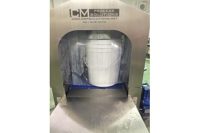Time to do your homework
PMMI panelist and food safety authority Tony Pavel Jr. advises food processors, suppliers to prepare for Food Safety Modernization Act requirements.
Passed into law In 2010, industry observers say the Food Safety Modernization Act (FSMA) is the most comprehensive food safety legislation of the past 50 years.
Because this legislation impacts the entire processing and packaging supply chain, the Packaging Machinery Manufacturers Institute (PMMI) invited attorney Tony Pavel Jr., a partner at K&L Gates LLP and an authority on the new legislation, to participate in a food safety panel discussion during PMMI's second annual "PACK EXPO Thought Leaders Dinner" last month in Chicago.
PMMI followed up with Pavel after the event to learn more about how the legislation will affect food manufacturers, processers and packagers.
Q: What are the immediate implications of the FSMA for manufacturers?
Tony Pavel Jr.: Quite frankly, while the legislation is quite robust, and the U.S. Food & Drug Administration (FDA) says implementation is on schedule, there is a large gray area about finding the funding for the legislation. That uncertainty makes the timing for many parts of the FSMA unclear.
Q: What about cost implications? Will the price of packaging increase significantly?
TP: While the goal of the FSMA is to ensure that consumers are getting the safest food possible, there will clearly be an increased financial burden on the food manufacturer. How “significant” the cost increase will be depends on a number of factors, including the content of the final FDA regulations/guidance; costs for consultants, if needed; auditing costs; testing costs; and new fees (re-inspection), all of which will affect the final price of packaging and foods.
Q: In terms of compliance, what are packaging plants responsible for?
TP: FSMA imposes a number of new requirements on “registered facilities,” i.e., any establishment that manufactures, processes, packs or holds food. New requirements include biennial registration with the FDA, performing hazard analyses and additional recordkeeping requirements, including the preparation of written control plans.
The statute also imposes verification requirements for firms’ preventive controls. Any packagers importing food will need to implement verification programs to ensure food safety. Facilities should also prepare for more frequent FDA inspections – a minimum of once every five years. In addition, it’s important to know that FSMA gives the FDA greater authority to review a company’s records in situations where the FDA has a reasonable belief that a particular article of food is adulterated and presents a serious health risk. The FDA may access all records relating to that article of food or any other article of food that the agency reasonably believes is likely to be similarly adulterated.
Q: How should food manufacturers be prepared to address issues of supply chain management?
TP: Initially, food manufacturers should review their current supplier verification programs (and current suppliers) to determine what changes may be needed to assure compliance with the preventive controls required by the FSMA. Supply agreements should be reviewed and updated to include provisions requiring compliance with FSMA provisions.
Companies should also look at their records management processes and determine what changes or improvements may be needed in order to respond FDA inspection requirements. Finally, firms will be responsible for assisting FDA in tracking and tracing high risk foods, though the items in this category are yet to be defined.
Q: To what extent are food manufacturers now liable for their suppliers under the FSMA?
TP: Food manufacturers have in many ways always had liability for their suppliers. The company whose name is on the final product is ultimately responsible for what went into that product. But the FSMA places additional responsibilities on manufacturers to ensure that their suppliers are in compliance with FDA’s requirements as part of their hazard analysis and risk-based prevention plans. Food importers, however, have the additional requirements of implementing foreign verification programs in order to ensure food brought into the U.S. is safe.
Q: How will FSMA affect the day-to-day operations of packaging suppliers and food manufacturers? How should they prepare for these changes?
TP: A majority of firms already have some form of Hazard Analysis & Critical Control Points (HACCP) in place, so impact will vary depending on the level of enhancement needed to a company’s control plans and processes. There will be additional recordkeeping requirements that will affect work load, and adjustments will eventually need to be made for certain practices, such as having all testing for regulatory purposes performed at a federal laboratory or an accredited non-federal laboratory.
Preparation will require a review of current practices (HACCP , Good Manufacturing Practices, Sanitation Standard Operating Procedures, etc.), and officials should closely monitor the FDA’s rulemaking and guidances that will flesh out the requirements of FSMA during the next two to five years.
Food packaging and processing professionals can gain insight into the latest technologies that will help them comply with FSMA legislation at PACK EXPO Las Vegas 2011 (September 26-28; Las Vegas Convention Center). Discounted registration is currently available at www.packexpo.com.
Looking for a reprint of this article?
From high-res PDFs to custom plaques, order your copy today!







